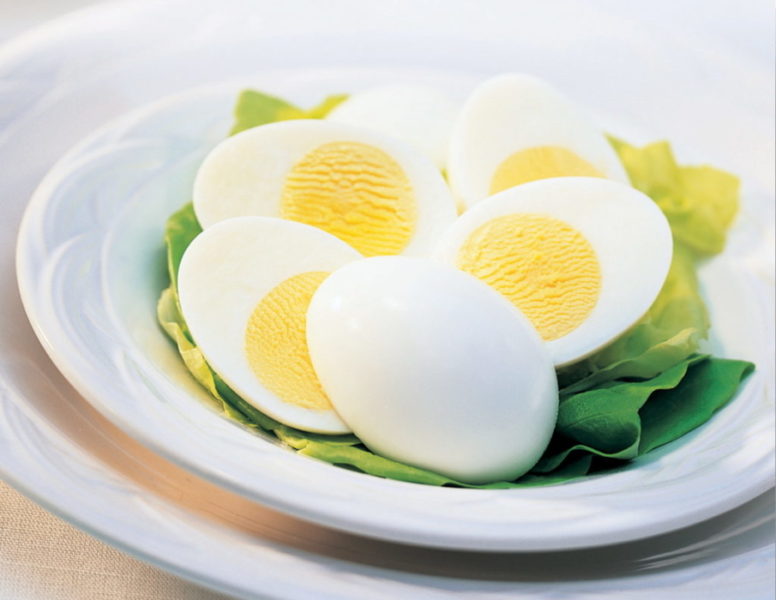For a successful fight against excess weight, a balanced diet is important taking into account the required amount of proteins, carbohydrates and fats. One of the valuable sources of animal protein is chicken eggs. You need to know how much protein in an egg in order to properly compose a diet.
Material Content:
Chemical composition and energy value
Chicken eggs are the number one product for anyone who follows a diet or sports. They contain many useful substances and a large amount of easily digestible protein.
In the composition of the yolk:
- 12% protein;
- 24% fat;
- 12% phospholipids;
- 1-2% of cholesterol;
- 3-4% of minerals.
It is because of the presence of fat in the composition that many people, including athletes, refuse to eat yolks. But the protein of a chicken egg is 75% water. Also in it - almost 13% of protein, 11% of fat and 1% of trace elements necessary for the body.
The energy value of the product also depends on the part of the egg in question. Yolk contains 350 kcal (100 g), and protein - only 45 kcal. In general, the energy value of 100 g of egg is about 156 kcal.
The composition contains a large amount of retinol (142 μg), vitamin D and B vitamins. It is because of the large number of the latter that eggs are so useful.
The product is a valuable source of magnesium and phosphorus, contains about 50 mg of calcium and a small amount of zinc.
The yolk contains many amino acids and a large amount of oleic acid.
Determining the number of calories in one egg per eye is quite problematic, you have to arm yourself with a kitchen scale.True, to obtain accurate data, you need to separately calculate the calorie content of protein and yolk.
On average, nutritionists provide such data:
- medium egg - 75 kcal;
- large - 85 kcal;
- very large - 92 kcal.
As you can see, the egg is a valuable product for health, as it saturates the body with a number of necessary substances, while it contains relatively few calories, which is especially important for those who follow a diet.
How much protein is in an egg
How much protein is in one egg - it depends on its size. On average, 100 grams of product contains about 13 grams of protein. In 1 pc protein, respectively, less - from 8 to 11 g.
A large boiled egg contains an average of 9.5 g of protein, and soft-boiled egg - about 10 g. It is difficult to accurately calculate the amount of protein, here are approximate values.
The benefits of digestible protein in the diet
Having figured out how much protein is in a chicken egg, you should know why this product is so useful in the diet. The main role in a low-calorie diet is played by a feeling of fullness. The fact is that eggs are a product quite heavy for the stomach, so it takes a lot of time to digest them. Having eaten only 1 boiled egg, a person will feel full for at least 3-4 hours.
In some diets, eggs are the main product, for example, in the so-called “drying” program or ketone diet. The principle of such a diet is to significantly reduce carbohydrates and increase the amount of protein. The body needs a lot of time to absorb protein, and fat reserves are spent on this process, which are not replenished due to the lack of simple carbohydrates in the diet. As a result, fat burning is noticeably faster, and a person is rapidly losing weight. True, such a diet is a serious test for the liver, so it is important to make the right menu. In addition, it is not recommended to get involved in the ketone diet, as it is accompanied by mood spikes and fatigue.
The effect of protein on muscle mass
Protein acts as a building material for muscles. This substance cannot be dispensed with during a period of intense power loads, otherwise the muscles simply will not grow. It is important to eat eggs for both professional athletes and amateurs who are more likely to lose weight by exercising in the gym and dieting. In the first case, the product will become an “energy bomb”, since protein enhances endurance, and in the second case it will help to consume fats, but maintain muscle during the process of losing weight.
Professional athletes are not enough proteins that a person receives with food. Here protein powder comes to the rescue - an important sports supplement, without which it is difficult to form a beautiful muscle relief. The raw materials for the manufacture of such an additive are natural eggs.
Harm and contraindications
The yolk contains a lot of cholesterol, but recent studies have shown that eggs as a whole do not significantly affect the development of vascular atherosclerosis. Nevertheless, many refuse yolks for other reasons - because of the fat content and high calorie content. The use of egg whites alone is recommended for those who follow a strict diet.
The main contraindication to use is intolerance to this product, since eggs are strong allergens. In severe liver diseases, they should also be abandoned or significantly reduced use due to increased load on this organ.
In order not to harm health, it is recommended to take eggs for food no more than 4 times a week. The optimal amount is 1-2 eggs per day.
If a person is faced with the task of increasing muscle gain, it is recommended to pay attention to egg white powder for athletes, because it contains about 97% of the protein, which is completely absorbed by the body.
















